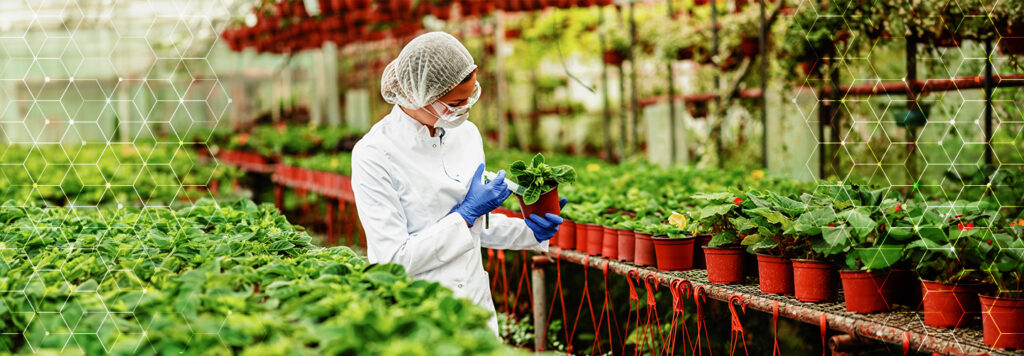How a Plant Nursery Management System Can Streamline Inventory Control?

Plant nurseries are the nurturing grounds for a diverse range of plant species, from vibrant flowers to hardy trees. They cater to a dynamic market with seasonal shifts and fluctuating demand, making precise inventory control a daunting challenge.
Effective inventory management, therefore, becomes vital for sustaining healthy plant stock, meeting customer demands, and optimizing profitability. Plant nursery management systems are emerging as a game-changer in this regard, offering key insights to horticulturists, nursery owners, and green enthusiasts alike. These insights further translate into improved accuracy, efficiency, and overall growth for plant nurseries.
The Evolution of Inventory Control in Plant Nurseries
Plant nurseries have evolved from simple propagation centers to sophisticated operations, aligning with changing cultural, technological, and environmental dynamics while continuing to supply the world with a diverse array of plants. Such evolution has also brought monumental shifts in inventory control and management in plant nurseries, from manual, paper-based systems to modern, digital solutions.
Historically, nurseries relied on handwritten records and spreadsheets, leading to inefficiencies, inaccuracies, and limited scalability. With advancements in technology, the industry has embraced plant nursery management software. This software provides real-time inventory tracking, species-specific databases, and automation of sales and ordering processes. Furthermore, barcode scanning and analytics tools enhance precision and decision-making.
Plant nursery management software streamlines operations, reduces waste, and boosts overall efficiency, enabling nurseries to meet the challenges of a dynamic market with diverse plant species, making it an essential component of modern nursery management.
The Current State of Plant Nursery Inventory Control – Key Challenges
Plant nurseries face several distinct challenges in managing their inventory effectively:
- Seasonal Variability: The demand for different plant species can vary significantly with the changing seasons. Nurseries must anticipate these fluctuations to ensure they have the right plants in stock when customers seek them. Overstocking can lead to financial losses, while understocking can result in missed sales opportunities. Balancing inventory to match seasonal demand is a constant challenge.
- Species Diversity: Nurseries typically host a wide variety of plant species, each with its unique requirements for care, maintenance, and growth. This diversity complicates inventory management, as it necessitates tracking and managing various plants with different growth rates, lifespans, and environmental needs. Ensuring the health and vitality of each species requires a granular approach to inventory control.
- Perishable Nature of Inventory: Unlike many other industries, plant nursery inventory is highly perishable. Plants can quickly deteriorate if not adequately cared for. Dead or unhealthy plants not only result in financial losses but also damage a nursery’s reputation. Effective inventory control must ensure that plants are sold or moved at the right time to maintain their health and quality.
These challenges collectively underscore the need for advanced inventory control solutions that can adapt to the dynamic nature of the plant nursery industry and provide real-time data and insights for informed decision-making.
Plant Nursery Management System – Streamlining Inventory Control
A plant nursery management system is a powerful tool that revolutionizes plant nursery management by providing real-time data, enhancing species-specific care, simplifying inventory control, automating processes, and facilitating data-driven decision-making, all of which contribute to the overall success and sustainability of plant nurseries.
Key features and functionalities of plant nursery management systems include:
- Inventory tracking and management
- Species database
- Barcode scanning
- Sales and order processing
- Reporting and analytics
The Role of Modern Technologies in Plant Nursery Inventory Control
In recent years, the rapid integration of technologies has revolutionized various operations in agriculture in general and plant nurseries in particular. This is not an exception when it comes to inventory control in plant nurseries.
Sensor Technology for Real-time Inventory Updates
Sensors, such as temperature and humidity monitors, are strategically placed in greenhouses and outdoor growing areas. These sensors continuously collect data and transmit it to the plant nursery management software in real-time. If the temperature drops below a certain threshold, the software can automatically trigger alerts and even initiate actions, such as moving vulnerable plants indoors or adjusting heating systems. This real-time data ensures that plants are always in optimal conditions, reducing the risk of loss due to environmental factors.
IoT for Species-specific Data Management
IoT takes species-specific care to the next level. Sensors and actuators, embedded in pots or plant beds, can monitor individual plant conditions. For example, sensors can measure soil moisture and nutrient levels, while actuators can adjust water and nutrient delivery accordingly. This granular data is fed into the plant nursery management software, allowing for precise, automated care tailored to each plant’s specific needs. This level of personalization enhances plant health and overall inventory quality.
RFID for Simplifying Identification
RFID tags emit radio signals, enabling wireless and non-line-of-sight identification. When a plant with an RFID tag is moved, sold, or watered, the system automatically updates the plant’s status and location in the plant nursery management software. This RFID technology significantly speeds up the identification process, reducing the time and effort required for manual scanning. It also minimizes errors and ensures that inventory records remain accurate.
E-commerce Integration to Automate Ordering and Sales
E-commerce integration goes beyond automating orders. It allows nurseries to showcase their entire inventory online, complete with photos, descriptions, and real-time availability. Customers can browse and purchase plants at any time, even outside of regular business hours. The plant nursery management system manages these online sales seamlessly, updating inventory levels instantly. The integration also includes features like online payment processing and shipping calculations, streamlining the entire sales process.
AI and ML for Data-driven Decision-making
AI and ML algorithms can analyze vast amounts of data collected by the plant nursery management system. For instance, they can recognize patterns in customer buying behavior, identifying which plants are most popular during specific seasons. They can also predict plant health issues based on environmental data and historical trends. Moreover, AI can suggest optimized inventory levels by considering factors like sales history, growth rates, and market trends. These insights empower nursery owners to make informed decisions, reduce waste, and maximize profitability.
Technological advancements greatly enhance the capabilities of plant nursery management systems for inventory control. They enable real-time monitoring, precise care, efficient identification, automated online sales, and intelligent decision-making, making inventory control more accurate and efficient while ensuring healthier, more profitable plant nurseries.
FarmERP, a robust plant nursery management software, empowers nurseries with advanced inventory control capabilities. It offers real-time tracking of plant inventory, automates species-specific care through IoT integration, and utilizes RFID technology for efficient plant identification. FarmERP’s comprehensive features and technology-driven solutions make it an essential tool for modern plant nurseries seeking streamlined inventory control and operational efficiency.
Reach out to learn how we can help meet your needs for inventory control in plant nurseries.
